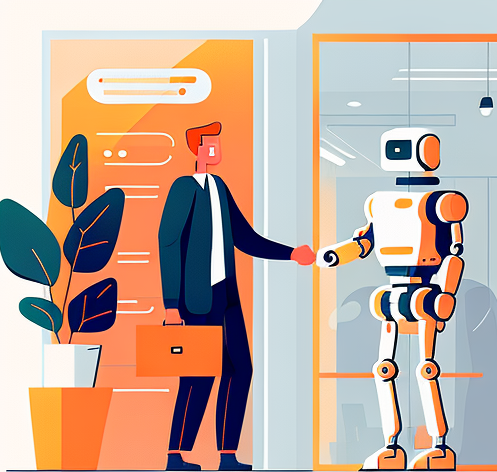ChatGPT, BARD and AI tools will eat your job if you don’t do this!

Artificial Intelligence (AI) is expected to have a significant impact on the job market in the coming years. While some jobs may be replaced by AI and automation, it is also likely to create new job opportunities in fields such as data analysis, machine learning, and software development. AI tools like chatGPT, BARD and others may also displace workers in certain industries, particularly in manual labour and low-skilled jobs that can be easily automated. The exact impact of AI on the job market will depend on various factors such as the speed of technological progress, the extent to which jobs can be automated, and the ability of workers to acquire new skills. On the one hand, AI has the potential to increase efficiency and productivity, leading to cost savings for businesses and potentially freeing up workers from repetitive tasks.
It is important to note that AI will not necessarily lead to mass unemployment, as some experts predict that new jobs will be created to replace those that are lost. However, it is also likely that many workers will need to acquire new skills and adapt to changing job requirements in order to stay employed. The impact of AI on the job market will be complex and multifaceted. It is essential for workers to stay informed about the latest developments in AI and to continually develop new skills in order to remain competitive in the job market.
Jobs that are most vulnerable to AI
Data entry and administrative tasks: AI can automate repetitive and time-consuming tasks such as data entry, invoicing, and scheduling. For example, a chatbot can handle basic customer service inquiries, freeing up human customer service representatives to handle more complex issues.
Customer service and telemarketing: AI-powered virtual assistants and chatbots can handle routine customer inquiries and support tasks, freeing up human customer service representatives to handle more complex issues. For example, an AI-powered virtual assistant can handle scheduling appointments, answering frequently asked questions, and directing customers to relevant resources.
Assembly line and manual labor jobs: AI and robotics can perform repetitive and physically demanding tasks with greater speed and precision, freeing up human workers to focus on more complex tasks. For example, a robot can handle tasks such as assembly line work or packaging, allowing human workers to focus on tasks that require creativity and critical thinking.
Routine financial analysis and accounting: AI can automate routine financial analysis tasks such as data entry and analysis, freeing up human employees to focus on higher-level tasks such as strategy development and decision-making. For example, an AI system can automatically analyse data and generate reports, freeing up human employees to focus on more strategic tasks.
Repetitive journalism and news writing: AI can automate the writing of routine news articles and reports, freeing up human journalists to focus on more in-depth and investigative reporting. For example, an AI system can generate a news article summarizing financial earnings reports, freeing up human journalists to focus on more complex stories.
Simple legal research and document review: AI can automate routine legal research tasks such as document review and analysis, freeing up human lawyers to focus on higher-level tasks such as strategy development and decision-making. For example, an AI system can automatically analyse legal documents and flag relevant information, freeing up human lawyers to focus on more strategic tasks.
Simple data analysis and visualization: AI can automate routine data analysis and visualization tasks, freeing up human employees to focus on more complex tasks such as strategy development and decision-making. For example, an AI system can automatically analyze data and generate reports and visualizations, freeing up human employees to focus on more strategic tasks.
Translation and language interpretation: AI can automate routine translation and language interpretation tasks, freeing up human linguists to focus on more complex tasks such as language teaching and cultural analysis. For example, an AI system can automatically translate text or speech in real-time, freeing up human linguists to focus on more strategic tasks.
Simple market research and surveys: AI can automate routine market research and survey tasks, freeing up human market researchers to focus on more complex tasks such as strategy development and decision-making. For example, an AI system can automatically analyze survey data and generate reports, freeing up human market researchers to focus on more strategic tasks.
Scheduling and appointment booking: AI can automate routine scheduling and appointment booking tasks, freeing up human employees to focus on more complex tasks such as customer service and relationship building. For example, an AI-powered virtual assistant can handle scheduling appointments and reminders, freeing up human employees to focus on more strategic tasks.
How can I be prepared for the changes that AI will bring to my job? What to do?
To be prepared for the changes that AI will bring to your job, you can take the following steps:
Upskill and reskill: Invest time and resources into learning new skills that are in demand, such as data analysis, programming, or digital marketing. These skills will help you remain competitive and relevant in the job market.
Stay informed about AI and its applications: Stay informed about the latest AI developments and its applications in your industry. This will give you a better understanding of the changes that are likely to happen and help you prepare for them.
Embrace digital transformation: Make sure to adopt new digital tools and technologies in your workplace as soon as possible. This will help you familiarize yourself with the digital environment and prepare for future changes.
Network with others: Networking with other professionals in your industry can help you stay informed about the latest developments in AI and its impact on your field.
Be flexible and adaptable: Be open to change and be willing to learn new things. The more flexible and adaptable you are, the easier it will be to adapt to changes brought about by AI.
Focus on tasks that require human skills: AI is likely to replace tasks that can be automated, so focus on tasks that require human skills such as creativity, critical thinking, and problem-solving.
Collaborate with AI: Instead of fearing AI, embrace it and find ways to collaborate with it. By doing this, you can enhance your own capabilities and make the most of AI’s capabilities.
Remember, AI is not just a threat to jobs, but also an opportunity for individuals and businesses to improve their performance and competitiveness. By preparing for the changes that AI will bring, you can position yourself for success in the future.
Some examples of collaborating with AI to make job easier
Here are some examples of how you can collaborate with AI to make your job easier:
Customer service: AI chatbots can handle routine customer inquiries and provide quick answers, freeing up human customer service representatives to handle more complex issues that require human interaction.
Marketing: AI algorithms can analyze vast amounts of data and provide insights on customer behavior, allowing marketers to tailor their campaigns more effectively.
Healthcare: AI algorithms can assist doctors in diagnosing diseases and predicting health outcomes, improving the accuracy and efficiency of the healthcare system.
Finance: AI algorithms can assist financial analysts in analyzing large amounts of data and identifying patterns, allowing them to make more informed investment decisions.
Supply chain management: AI algorithms can assist supply chain managers in optimizing their operations and reducing waste, improving the efficiency and sustainability of supply chain operations.
Human resources: AI algorithms can assist HR departments in identifying the best candidates for a job, reducing the time and effort required to find the right person for the job.
Content creation: AI algorithms can assist content creators in generating new ideas, writing articles, and even creating video content, freeing up more time for creative and strategic thinking.
AI may replace some tasks within these jobs, but it is unlikely that it will completely replace entire industries or job roles. Instead, AI will likely augment and enhance these jobs, allowing employees to focus on higher-level tasks and decision-making. Also, new jobs will likely be created in industries related to AI development and maintenance, so while some jobs may be impacted, overall employment is unlikely to suffer greatly as a result of AI.
Instead of fearing the AI, you can adapt to the change and use it for your advantage. Remember that invention of calculators didn’t remove accountant’s job, but made it easier instead. By collaborating with AI, you can automate repetitive and time-consuming tasks, freeing up more time to focus on the things that matter the most and improving overall efficiency.
